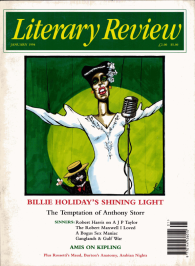Kingsley Amis
Doctor’s Dilemma
Kipling the Poet
By Peter Keating
Secker & Warburg 288pp £20
Even now, over half a century after his death, Kipling’s poetry is undervalued. His fiction has done rather better, though critical attention and esteem has tended to fasten on the later, more complicated and difficult stories such as ‘Day-spring Mishandled’. I prefer the earlier, shorter ones myself, but they give critical attention much less to bite on, write on, lecture on. In this they resemble the verse, which is mostly quite clear, without any interesting ambiguities or obscurities. To deal with it satisfactorily, one must recognise that at least an attempt at a special approach is needed.
Peter Keating mostly fails to furnish anything of the sort. Perhaps I could let him down a bit more lightly by observing that his book claims to deal with Kipling the poet rather than Kipling’s poetry. Even so, it would have been closer to the mark to label the book

Sign Up to our newsletter
Receive free articles, highlights from the archive, news, details of prizes, and much more.@Lit_Review
Follow Literary Review on Twitter
Twitter Feed
It wasn’t until 1825 that Pepys’s diary became available for the first time. How it was eventually decrypted and published is a story of subterfuge and duplicity.
Kate Loveman tells the tale.
Kate Loveman - Publishing Pepys
Kate Loveman: Publishing Pepys
literaryreview.co.uk
Arthur Christopher Benson was a pillar of the Edwardian establishment. He was supremely well connected. As his newly published diaries reveal, he was also riotously indiscreet.
Piers Brendon compares Benson’s journals to others from the 20th century.
Piers Brendon - Land of Dopes & Tories
Piers Brendon: Land of Dopes & Tories - The Benson Diaries: Selections from the Diary of Arthur Christopher Benson by Eamon Duffy & Ronald Hyam (edd)
literaryreview.co.uk
Of the siblings Gwen and Augustus John, it is Augustus who has commanded most attention from collectors and connoisseurs.
Was he really the finer artist, asks Tanya Harrod, or is it time Gwen emerged from her brother’s shadow?
Tanya Harrod - Cut from the Same Canvas
Tanya Harrod: Cut from the Same Canvas - Artists, Siblings, Visionaries: The Lives and Loves of Gwen and Augustus John by Judith Mackrell
literaryreview.co.uk